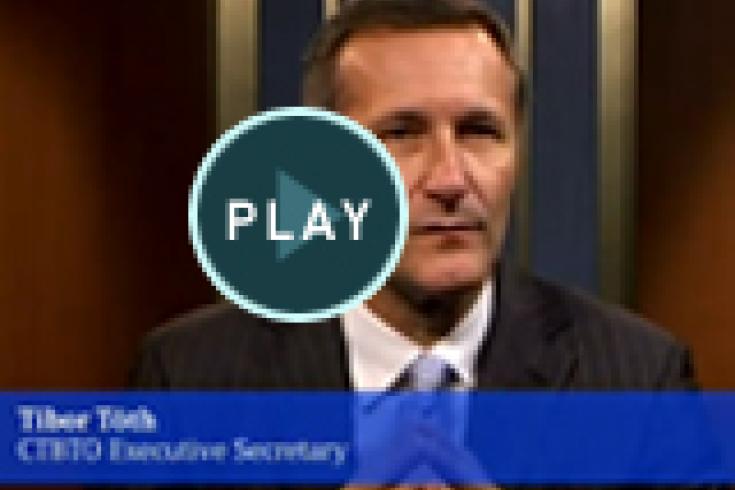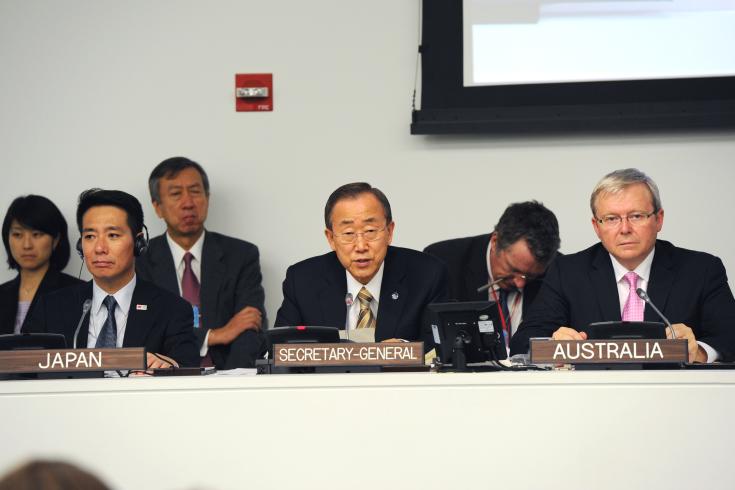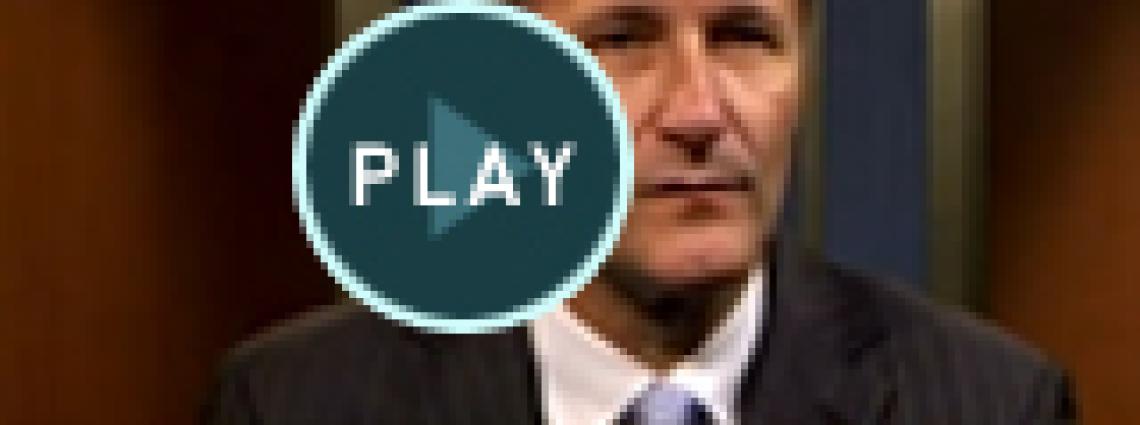Fifth Ministerial Meeting to Promote CTBT entry into force Held on Eve of Treaty's 14th Anniversary
On the eve of its anniversary, foreign ministers of Member States convened a meeting to promote the Treaty’s entry into force at the United Nations in New York. The fifth of its kind, the biennial meeting was convened by Australia, Canada, Finland, France, Japan, Morocco, and the Netherlands. Over 70 countries participated, of which 24 were represented at the ministerial level.
“We commit ourselves individually and together to make the Treaty a focus of attention at the highest political level and to take measures to facilitate the signature and ratification process as recommended in the 2010 NPT Review Conference Final Document,” declared the foreign ministers attending the meeting in a joint Ministerial Statement.
To date, 62 countries have endorsed the Ministerial Statement and the number is expected to increase by the end of the year when the Statement is submitted to the United Nations General Assembly.

CTBTO Executive Secretary, Tibor Tóth, joined UN Secretary-General Ban Ki-moon and Australian Foreign Minister, Kevin Rudd, in New York for a high-level meeting of Foreign Ministers of countries belonging to the CTBT.
Press briefing by Ban Ki-moon and Kevin Rudd
“It is high time to translate political will into concrete action,” Tóth said. “We do not have the luxury of time. Our action, or lack thereof, will define how our security will look for decades to come.”
UN Secretary-General Ban Ki-moon told journalists in a press briefing with Kevin Rudd, Australia’s Minister of Foreign Affairs and Chair of the meeting: “The path toward nuclear disarmament means an end to nuclear test explosions and an end to the development of nuclear weapons.”
He urged all governments that have not yet done so to sign and ratify the CTBT without further delay and repeated his call for the international community to bring the Treaty into force by 2012.
The global community must aim for a world in which the CTBT is honoured by all, Australian Foreign Minister Kevin Rudd told journalists.
Remaining nine ratifications urged
The CTBT is only nine ratifications shy of entering into force. Endorsements by China, the Democratic People’s Republic of Korea (DPRK), Egypt, India, Indonesia, Iran, Israel, Pakistan and the United States will bring it into force. These countries belong to a group of 44 nuclear technology holder States listed under Annex 2 of the Treaty whose ratification is mandatory for it to enter into force. Indonesia announced in May that it had initiated the ratification process of the Treaty.
“Our primary challenge remains unchanged: to ensure that the remaining nine Annex 2 States who have not yet ratified do so without further delay. The United States has an important leadership role to play in this regard,” Ireland’s Minister of Foreign Affairs, Micheál Martin said at the Meeting.
The United States, which was represented for the first time in the Ministerial meeting, reaffirmed its commitment to secure U.S. ratification of the CTBT.
“The successful entry into force of the CTBT remains an essential milestone along the road to achieving President Obama’s vision of a world free of nuclear weapons,” said the United States.
The United States went on to say that while the Obama administration is confident that the Senate will vote to ratify the Treaty once the full facts have been presented, it is important to “undertake the research and analysis needed to evaluate the complex issues raised by the Treaty” so that senators’ concerns may be properly addressed enabling them to “make a fully informed decision when the Treaty is taken to a vote.”

UN Secretary-General Ban Ki-moon addresses the opening of the Ministerial Meeting on the CTBT. Left, Seiji Maehara, Minister of Foreign Affairs of Japan; Right, Kevin Rudd, Minister for Foreign Affairs of Australia and Chairperson of the Meeting. Photo Credit: UN Photo/Garten
Many countries at the Ministerial Meeting expressed support for sustaining the current voluntary moratorium against testing. However, they also stressed that this is not a substitute for a legally-binding Treaty.
“Testing moratoria can never be a substitute for a comprehensive, universal and legally binding agreement. We must ensure that the Treaty enters into force, or the norm may lose its force,” Jonas Gahr Støre, Norwegian Minister of Foreign Affairs, advised the meeting.
Treaty’s verification regime praised
Ministers at the meeting also deplored the DPRK nuclear tests carried out in 2006 and 2009 as a serious violation of the strong norm against nuclear testing while at the same time praising the credibility and reliability of the CTBT’s verification regime as demonstrated by the accurate and timely detection of the DPRK tests.
The nuclear tests by the DPRK in 2006 and 2009 highlight the urgent need for the entry into force of the Treaty as soon as possible, the Joint Ministerial Statement said.
“The prompt detection of both tests by the CTBT’s International Monitoring System gave strong testimony of the verification regime’s ability to detect even small underground nuclear explosions,” stated the European Union.
“We remain confident of the verification regime’s future ability to provide the international community with an independent, reliable and cost-effective means of verifying, and deterring, any violation of the Treaty’s provisions,” the EU further stated.
Mr. Taib Fassi Fihri, Minister of Foreign Affairs and Cooperation of Morocco addresses the Meeting.
The Philippines drew attention to the scientific and civil benefits of the CTBT’s verification system, such as the use of monitoring data by tsunami warning centres and other similar disaster alert systems, particularly because of the destructive power of such natural disasters in his region, said Alberto G. Romulo, the Philippines’ Secretary of Foreign Affairs.
Concrete action important
Countries participating in the Ministerial Meeting agreed that while the positive momentum created by political commitments is encouraging, it is more important that countries maximize efforts to seize upon this rare and narrow window of opportunity by translating commitments into concrete action.
“While Brazil welcomes declarations by some of these States regarding their renewed efforts toward the ratification of the Treaty, it is vital that such intention[s] lead to concrete results,” declared Brazil in its statement.
“No effort must be spared for bringing the CTBT into force forthwith. The ban of nuclear weapons testing is but one step towards complete nuclear disarmament. It is, nonetheless, a major one – and, most importantly, one of the closest to our reach,” Brazil added.
http://www.ctbto.org/fileadmin/user_upload/public_information/2010/STATEMENTRev.16.09.pdf
Read statement by Tibor Tóth’s, CTBTO Executive Secretary here.
http://www.ctbto.org/fileadmin/user_upload/statements/23092010_CTBTMinisterial_ES_statement.pdf
Read statement by Ban Ki-Moon, UN Secretary-General here.
http://www.un.org/apps/sg/sgstats.asp?nid=4800
Watch the press stake-out here.
http://www.unmultimedia.org/tv/webcast/2010/09/media-stakeout-secretary-general-and-h-e-mr-kevin-rudd-mp-foreign-minster-of-australia.html
Read country statements here.
http://www.reachingcriticalwill.org/legal/ctbt/2010ministerial/statements.html
1 Oct 2010
